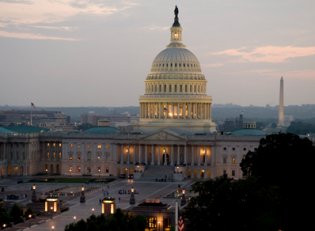
While the poker world has its calm before the storm of the start of the World Series of Poker on May 27, the biggest news has been the ongoing discussion on internet gaming and poker and the potential for state and/or federal regulation of the industry. Two different opinion pieces on popular websites fall in the category of, at the minimum, supporting the states’ rights to decide on the issue or, at the maximum, a federal framework to be established.
On the website HumanEvents.com (a popular conservative website), author Lawson Bader goes after the men who have recently pushed legislation that would completely ban online gaming and poker in the United States. Bader calls out Republican Senator Lindsey Graham and Republican Representative Jason Chaffetz in his opinion piece, correctly citing that the bills (H. R. 4301, S. 2159 and called “The Restoration of America’s Wire Act“), wouldn’t “restore” the original Wire Act of 1961. “Rather than restore the original interpretation of the Wire Ace,” Bader writes, “the bill would actually amend it by removing language banning sports betting only.”
Bader correctly asserts that the Wire Act would be added to – amended – to include a ban on all forms of online gaming, save for those that have caveats cut for them (horse racing and fantasy sports). “Graham and Chaffetz are on record as supporting “states’ rights” when it comes to Obamacare, Common Core school standards, gun laws, gay marriage and other issues,” Bader states. “Gambling is somehow different?”
Looking at gaming in the United States, Bader reports that almost every state has some form of the industry, be it casinos, lotteries or bingo parlors. He also looks to another writer, Michelle Minton, who wrote, “Despite this, and the fact that many other countries have legalized and regulated online gambling without descending into bedlam, anti-gambling advocates in the U. S….insist that online gambling is a step too far and allowing states to legalize that activity would lead to society’s ruin.”
In concluding his thoughts, Bader offers some words for Representatives and Senators who are on the fence regarding the issue of Graham and Chaffetz’ bills: “Heed the advice of Kenny Rogers, the old Gambler himself. This time, it’s not just knowing when to walk away, but also when to run.”
At TheHill.com Joe Valandra, the Chief Executive Officer of Great Luck LLC, a top gambling firm that works with Indian tribes, offers up his own thoughts on the proposed legislation from Graham and Chaffetz. He first cites the Indian Gaming Regulatory Act of 1988 and how it allowed tribes to offer casino gaming. With the future now moving towards the internet, Valandra states that the Graham/Chaffetz efforts “would prohibit online gaming nationally and…severely compromise Tribal jurisdiction over Class II games like bingo and make any expansion of gaming by the tribes to include the internet illegal.”
“Thousands of Americans play games online now, some for a wager and some for entertainment,” Valandra writes. “The fast paced trading of securities with no limits already takes place 24 hours a day, enabled by Internet access. Nevada, New Jersey and Delaware have legalized the Internet as a vehicle for the play of wagering games. The horse is out of the barn. Closing it now and punishing anyone that plays or offers gambling via the Internet is out of touch with reality.”
Valandra is also against any passage of the Graham/Chaffetz bills, stating, “Congress should be in the business of enforcing laws, not taking away states’ rights and the rights of sovereign Indian Tribes. Yet, this is precisely what S.2159 and H.R. 4301 will do if they become law. As the Internet gambling debate continues to unfold, I hope federal lawmakers on both sides of the aisle will actively work together with Tribal governments to protect tribal sovereignty and abide by federal regulations and guidelines already encompassed in federal law.”
The new arrivals to the pro-online gaming crowd (at least to letting the states decide the issues) are from areas that normally wouldn’t jump on the bandwagon. As the debate moves forward, there seem to be more lined up for allowing for the states to make the call on the industry and, for the federal government, to either stay out of the issue or pass their own regulatory laws.























